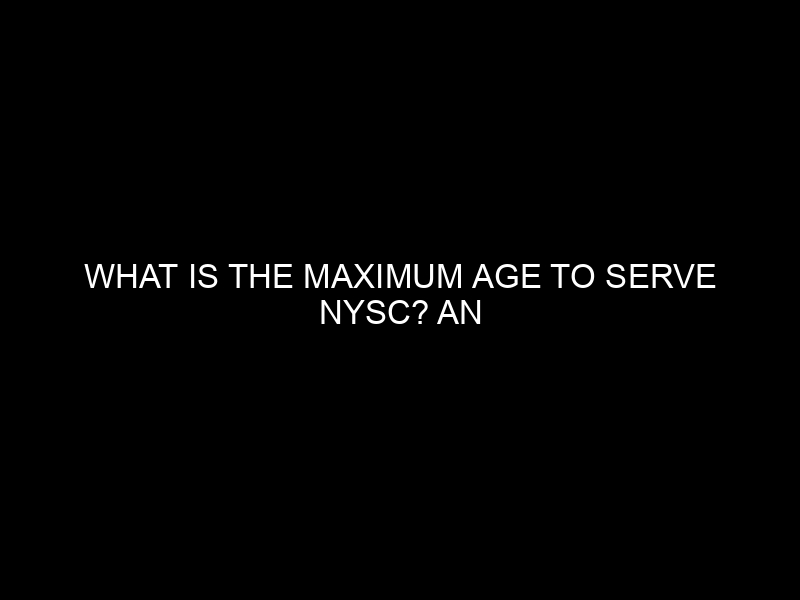The National Youth Service Corps (NYSC), a program established post-civil war under Decree No. 24 of May 22, 1973, stands as an embodiment of Nigeria’s quest for cultural cohesion and a robust, unified future. The scheme, pivotal in fostering national unity and development, mandates tertiary institution graduates’ participation, provided they meet specific criteria—one of the most discussed being the age limit. This comprehensive guide delves into the intricacies of the age restrictions applied to NYSC service.
The Genesis of NYSC’s Age Policy]
Why Does the NYSC Have an Age Limit? The NYSC’s age limit, a policy aspect often subject to various interpretations, was instituted to maintain the corps’ vitality and dynamism, ensuring its members bring fresh, innovative perspectives vital to national development. Essentially, the maximum age to participate in the NYSC, set at 30 years (NYSC Act, Section 2), is grounded in the program’s original vision to engage the youth in nation-building actively. These young minds provide a reservoir of energy, adaptability, and resilience, quintessential for the challenges of the service year (NYSC official guidelines, 2021).
The Rationale Behind the 30-Year Age Ceiling
The 30-year benchmark isn’t an arbitrary figure but a calculated decision to capture a demographic within a specific life stage—early adulthood. Psychological and sociological studies, such as those by Erik Erikson, a renowned developmental psychologist, and the World Health Organization, suggest that this phase (18-30 years) is marked by exploration, identity vs. role confusion, and the quest for independence—traits that are symbiotic with the NYSC’s objectives of national integration and social development.
Exceptions and Exemptions
Navigating the Age Policy While the age limit stands, several exceptions have been institutionalized, acknowledging educational, societal, and personal variances that could impact graduates’ entry into the NYSC. Individuals who exceed the 30-year age threshold at the time of graduation or receipt of their first degree are granted an exemption certificate (NYSC Bye-Laws, Section 2a). This certificate, per the NYSC’s legislative framework, ensures that such individuals, though exempted from service, are not at a disadvantage regarding employment and national service.
The Role of the Exemption Certificate
The exemption certificate serves as a legal acknowledgment that an individual, while bound by the provisions of the NYSC Act, is excused from active service due to age constraints, amongst other criteria like health or military service (NYSC Act, 1993). It is a crucial document, often a prerequisite for formal employment and postgraduate studies within Nigeria, affirming one’s compliance with national legal statutes.
Implications of the Age Limit for Prospective Corps Members
The age limit policy, while clear, carries significant implications for students, educational institutions, and the broader socio-economic landscape. Delayed education start, elongated academic programs, or unforeseen personal circumstances leading to late graduation could result in potential corps members exceeding the age limit, thereby altering their NYSC experience.
Educational Planning and Career
Trajectories Astute awareness of the NYSC age policy is imperative for educational and career planning. Prospective students and educational counselors need to calibrate educational timelines, considering the age constraint. This foresight is especially crucial in disciplines requiring lengthy schooling, ensuring eligibility for NYSC participation upon program completion, if so desired.
The Age Policy in the Digital Age
Verification Processes In today’s interconnected world, verifying compliance with the NYSC age policy has evolved. The scheme has leveraged technology to streamline the verification process, ensuring authenticity and compliance. Digital platforms like the NYSC portal and the Integrated Tertiary Management Portal (ITMP) are pivotal in this digital verification era, cross-referencing data from academic institutions with prospective corps members’ details.
Data Integrity and Compliance
The emphasis on data integrity is paramount, necessitating accurate date-of-birth entries during academic registration processes. Discrepancies detected during the NYSC’s digital verification phase could result in disqualification, delayed mobilization, or administrative hiccups, reiterating the need for meticulousness and honesty from the onset.
Looking Ahead
The Future of the Age Policy As Nigeria evolves, so might the tenets governing the NYSC. Societal changes, educational trends, and national developmental goals could instigate a reevaluation of the existing age policy. However, any modifications would stem from a thorough legislative process, underscoring the policy’s significance in maintaining the NYSC’s integrity, relevance, and contribution to Nigeria’s socio-cultural and economic tapestry.
Frequently Asked Questions About NYSC’s Age Limit
Can the age limit for NYSC participation be extended?
The age limit is statutorily fixed at 30. Any change requires legislative action, involving rigorous policy review and stakeholder consultation, reflecting the program’s national significance.
What happens if I discover I’m above the age limit after receiving a call-up?
Report immediately to the NYSC, providing all necessary documentation. If verified, you’ll receive an exemption certificate, substituting for active service participation.
Does part-time study affect NYSC age eligibility?
No, the mode of study doesn’t affect eligibility. However, the age criterion remains applicable, necessitating strategic planning for part-time students to ensure compliance.
Are there advantages to serving in the NYSC before the maximum age?
Yes, early participation offers a wealth of benefits, including full immersion in the program’s cultural exchange, professional development opportunities, and eligibility for certain public and private sector roles.
Conclusion
Concluding Thoughts on NYSC’s Age Policy The NYSC’s age limit underscores the program’s commitment to harnessing the vibrancy, adaptability, and innovation of Nigeria’s youth in nation-building. While fixed at 30, understanding its nuances, exceptions, and strategic importance is crucial for prospective corps members, educators, and policy-makers. As we navigate an ever-evolving socio-academic landscape, staying informed and adaptable is key to optimizing the benefits of the NYSC scheme, both at an individual and national level.

